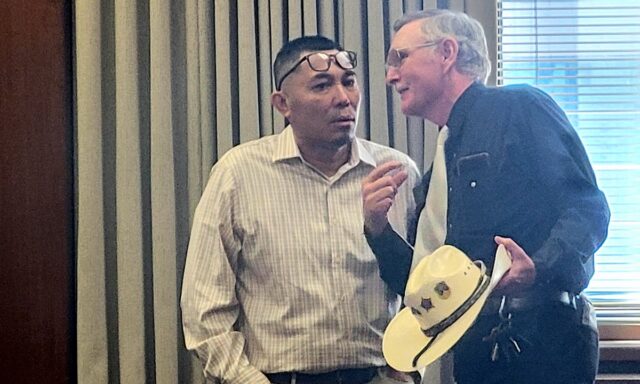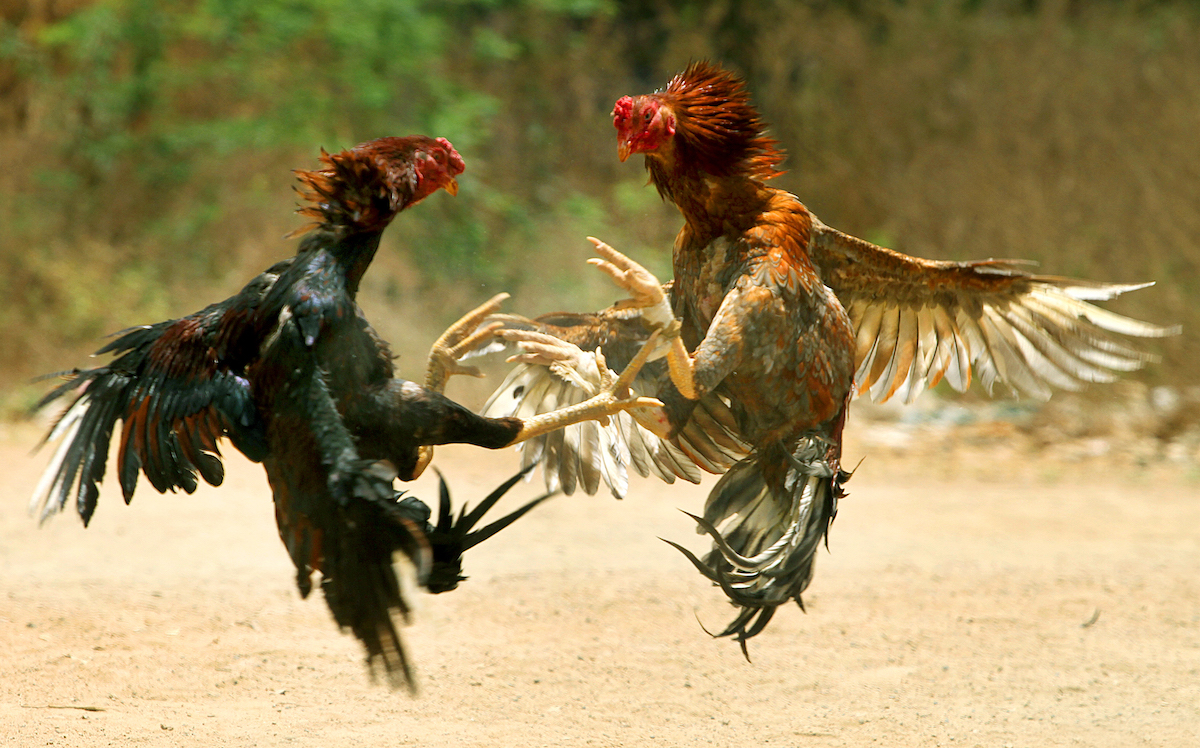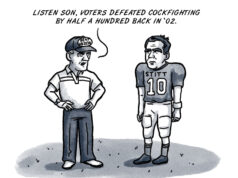

A Newalla man charged with 59 cockfighting-related felony counts after nearly 100 game-type birds were confiscated from his property last year was ordered to stand trial on just one of the counts after a preliminary hearing Tuesday in Oklahoma County District Court.
Before the hearing for Ellie Pennit Grino got underway, Oklahoma County Assistant District Attorney Tom Marrs announced prosecutors were dismissing 56 of the charges originally filed against him. That resulted in Grino facing three charges:
- one count of possessing birds with the intent to engage in a cockfight;
- one count of animal cruelty; and
- one count of keeping a place, equipment or facility to be used in permitting cockfighting. (His wife, Jannine Crespo Yee, also was named in that charge.)
But after a 90-minute preliminary hearing Tuesday, Oklahoma County Special Judge Jason Glidewell ruled that prosecutors failed to prove probable cause in the animal cruelty charge and the charge of keeping a place, equipment or facility to be used in permitting cockfighting.
Glidewell ruled there was no evidence that the birds had suffered, either because of lack of shelter or the dubbing — cutting off — of their combs, which is associated with cockfighting. He also said there was not sufficient evidence that certain supplies found on the property were used to train the birds to fight. However, he ruled that, taken together, the supplies, the roosters being tethered and separated, and the dubbing of the combs made it probable that the game fowl could have been being trained for cockfighting, which is illegal in Oklahoma as well as the other 49 states and the 16 U.S. territories.
Grino, 51, was ordered to go to trial on the count of possessing birds with the intent to engage in cockfighting. He remains free on $25,000 bond. His arraignment is set for Oct. 16.
“There’s no evidence that these birds were used in cockfighting, and the evidence would be that whoever buys the birds can choose to do what they want, and they can choose to do what is illegal or legal and just possess the birds,” Billy Coyle, Grino’s attorney, said after the hearing. “There’s nothing wrong with farming game fowl, and that’s what they were doing.”
Marrs referred questions to District Attorney Vicki Behenna’s office.
Brook Arbeitman, communications director with the Oklahoma County District Attorney’s Office, said prosecutors respect Glidewell’s decision.
“The DA’s office will proceed with prosecuting our case based on the merits and the evidence,” she said. “In an effort to maintain the integrity of the case as we proceed with prosecution, it would not be proper to comment further at this time.”
Only one witness called during hearing

Charges rarely have been filed since Oklahoma voters made cockfighting illegal 21 years ago. Grino is believed to be the first person charged with possessing birds with the intent to engage in cockfighting. Several months after Grino was charged, three men in Marshall County in southern Oklahoma were charged with possessing birds with the intent to engage in cockfighting. The three eventually agreed to plead guilty to a misdemeanor.
In Carter County last summer, a man who at the time was an official with an association promoting game fowl in Oklahoma, was charged with a felony count of promoting a cockfight. He eventually pleaded guilty to a lesser charge, a misdemeanor count of being a spectator at a cockfight.
Cockfighting, a blood sport made felonious by 56 percent of Oklahomans in 2002, resurfaced as a hot political issue at the Oklahoma Legislature in 2023 when a bill to let county voters decrease penalties to misdemeanors passed the House of Representatives. While it did not receive a hearing in the Senate, advocates with a group they call the Oklahoma Gamefowl Commission continued to push the issue this year, donating heavily to legislators and endorsing candidates for the 2024 election cycle.
Marrs called only one witness during Tuesday’s hearing. Julie Summerfield, an investigator with the Oklahoma City Animal Welfare Division, said officers confiscated 93 game-type birds — 50 roosters and 43 hens — along with 158 eggs from Grino’s property in Newalla. Some of the birds were sheltered by triangular covers, and others were in a pen that had metal siding over the top and on the sides. Some were tethered and not sheltered, and she said there was no chicken coop on the property.
“The roosters were housed individually, four in a pen with some hens,” Summerfield said. “The majority of the roosters were individually on tethers. Some had the triangle hut, some did not even have any form of shelter.”
The fact that the roosters were dubbed indicated they were being raised to be sold to cockfighters, she said.
“It’s a highly vascular tissue, so when they are in fighting and they get nicked, it’s a lot of blood in the fight, so to minimize blood loss during the actual fight, they will cut down the cone and wattle,” she said, referencing two thin, flexible flaps of skin that hang under a rooster’s beak.
Summerfield said she found minerals and vitamins in the house, and in a nearby shed found six boxes used to transport game fowl and a holding box that is used to contain a rooster before it takes part in a cockfight. She also said she found 181 magazines related to cockfighting with dates ranging from 1960 through 2014, as well as six notebooks filled with notes on contacts, breeding, fighting, schedules and rooster fight analyses, along with papers on the way to attach the metal spurs — called gaffs — used in cockfighting. The journals dated from 2000 through 2018.
Under cross examination from Coyle, Summerfield said the shed contained many boxes of items that had nothing to do with cockfighting.
Grino and Yee, 46, were accused of keeping a place, equipment or facility to be used in permitting cockfighting on their property off a dead-end street in Newalla, an unincorporated community in eastern Oklahoma County, just west of State Highway 270.
“I mean you’re allowed to raise roosters, and if the intent was for them not to be able to raise gamecock roosters, then the Legislature needs to get involved in this and see because there’s no evidence other than old memorabilia from years and years ago that shows there was any intent that these were gamecocks that were going to fight,” Coyle said.
Grino said after the hearing that roosters have to be separated because they otherwise would attack each other.
Grino said he was stopped by McCloud police on Easter Sunday of last year and officers found two empty game fowl transport boxes and seven pairs of gaffs in the back of his pickup. McCloud police contacted Oklahoma City police, who got a search warrant for his property the next day.
Grino claimed some of the birds were tethered because he had been exercising them.
Game fowl sold to buyers in Philippines, Mexico

After Tuesday’s hearing, Grino said he had so many pairs of birds because he mates them one-on-one.
During her testimony, Summerfield said the birds seemed to be fed and taken care of. Asked to estimate their worth, she estimated more than $50,000 was a fair figure.
“They were very nice-looking birds,” she said.
Asked what happened to the game fowl that were seized, Summerfield said they were given to a rescue group, which was going to rehabilitate them and put them up for adoption.
Grino said occasionally his family would eat the birds and eggs.
“Those are edible chickens,” he said.
But most of them he said he sold to buyers in the Philippines and in Mexico.
“I ship them broodstock and the babies, they do what they do with them,” he said. “In Mexico, I have buyers for them in different places.”
Grino said he has been raising game fowl since 1997 when cockfighting was legal. His long connection to the industry drew a notable spectator at Tuesday’s court hearing.
B.L. Cozad, a game fowl breeder from Indiahoma, showed up to support Grino, whom he said he has known since about 1994.
Cozad, who ran unsuccessfully for the House District 63 seat in 2012 and in 2014, said he has about 400 birds on his farm. Asked what he does with them, he said he harvests them.
Pressed further, he said, “I fight them.”
Asked where, Cozad said, “All over.”
He said laws criminalizing the game fowl industry are unconstitutional and that attempting to make criminals of game fowl farmers is a violation of human rights “based on the same type of animal rights laws Adolf Hitler used to destroy human rights in Nazi Germany.”
“Farmers and ranchers that are attempting to harvest our livestock earn a living and provide for our family,” Cozad said. “And somehow our government’s saying, ‘Well, chickens take priority above your ability to provide for your family.’ No, they don’t. Because if they take priority above our ability to harvest our livestock and provide for our family, then the government has elevated the chicken above our human rights.”
Cockfighting cases in other counties
In southern Oklahoma, felony cockfighting-related charges were reduced to misdemeanors in plea deals involving two men, one of whom at the time of his arrest was an official with the Oklahoma Gamefowl Commission, an industry association.
Chance Campo, from Lone Grove, was charged in July 2023 in Carter County with servicing or facilitating a cockfight. He was arrested as the result of a June 19 cockfight bust, and he since has resigned as a district director of the Oklahoma Gamefowl Commission.
A court document in the case described Campo’s felony charge as including but not limited “to promoting or refereeing birds at a cockfight, advertising a cockfight or serving as a stakeholder of any money wagered on any cockfight.” The felony charge carries a sentence of up to 10 years in prison and a fine up to $25,000.
Carter County District Attorney Melissa Handke dismissed the case against Campo on Feb. 22. The next day, Campo pleaded guilty to a misdemeanor count of being a spectator for a cockfight. He was given a two-year deferred sentence and ordered to pay a $500 fine.
In Marshall County, three men were arrested in June 2023 for illegal cockfighting. Herminio Mendoza, Jamie Bell and Jackson Bell were charged with possessing birds for fighting. The Bells were also charged with having and operating a cockfighting pit west of Madill, servicing or facilitating a cockfight and instigating or encouraging a cockfight.
Mendoza, 61, pleaded guilty in November to a reduced misdemeanor of disturbing the peace. Sentencing was deferred until Nov. 8, 2025. He was placed on probation and ordered to perform 100 hours of community service work or pay $1,000 to a local nonprofit organization as well as a $500 fine and court costs of $912.
On June 21, prosecutors reached plea deals with Jackson Bell and Jamie Bell. The four felony counts against each were dismissed in return for Jackson Bell, 54, and Jamie Bell, 52, each pleading no contest to one misdemeanor count of outraging public decency. Each was given a one-year deferred sentence, fined $1,000 and ordered to perform 25 hours of community service at a rate of 10 hours per month.
Cockfighting-group becomes more politically active
As cockfighting-related arrests have increased over the past 18 months, the Oklahoma Gamefowl Commission has stepped up its efforts to get involved in various political races.
The organization’s president, Anthony DeVore, went on TikTok to denounce Carter County Sheriff Chris Bryant for making cockfighting-related arrests. enforcing laws against animal cruelty, illegal immigration and drug trafficking. In the June 18 Republican primary, Bryant and challenger D.J. Long received the same number of votes, 2,569 each. The Carter County Election Board settled the tie by drawing a name from a bucket, and Long was declared the winner.
Oklahoma’s political activism surrounding cockfighting in 2024 has cut both ways. Anti-cockfighting advocates produced advertisements supporting Bryant and opposing Atoka County Sheriff Tony Head, who ultimately lost his reelection campaign. Ahead of the Aug. 27 Republican runoff in House District 50, the same opponents of the blood sport criticized candidate Stacy Jo Adams for her husband’s connections to cockfighting. Adams won the HD 50 seat handily.
Nonetheless, a group called Animal Wellness Action distributed a press release proclaiming that Aug. 27 was a “bad day” for the Oklahoma Gamefowl Commission because other OGC-supported legislative candidates lost.
“Animal Wellness Action, through AWA Oklahoma PAC, has been increasingly involved in election activities,” said Joseph Grove, the senior director of communications for AWA. “Animal Wellness Action has also filed a complaint with the Oklahoma Ethics Commission over campaign violations by the cockfighters’ PAC, the Oklahoma Gamefowl Commission.”
Despite its official-sounding name, the Oklahoma Gamefowl Commission is not a state agency. Blake Pearce, the secretary and policy chairman of the Oklahoma Gamefowl Commission, told NonDoc last year that the purpose of the 501(c)(4) group is to promote the interests of game fowl breeders in Oklahoma. He said the estimated 5,000 game fowl breeders in the state raise the birds and sell them mostly to buyers in other countries who breed them or show them. The birds they sell cannot be used for fighting, Pearce claimed, but their offspring can.
The Pearce family has long been involved in cockfighting, according to a 2017 video interview his father, Jeff, gave at their rooster-breeding operation in Sallisaw.
“He’s very much interested in the gamefowl, yes. He helps me a great deal. His name is Blake Pearce,” Jeff Pearce told two men from the Philippines about his son. “It runs in the blood. He’s got it from both ends. My father was a rooster fighter, and my wife’s father was a rooster fighter, so he had no choice. (…) We don’t have the freedom here that you have over there. Right now, it is illegal in our state here.”
Earlier this year, however, Blake Pearce told NonDoc that his group is not trying to legalize cockfighting. It supported a measure HB 2530 the past two legislative sessions, which would have reduced cockfighting from a felony to a misdemeanor for the first two offenses. The bill passed the House but died in the Senate.
“While we don’t condone any illegal activity of cockfighting, we still don’t believe it should be a felony on the first two times,” Black Pearce said. “This used to be legal here. (…) If you haven’t learned your lesson by the third, you deserve a felony.”
In April 2023, the Gamefowl Commission distributed a press release claiming that Oklahoma is home to 5,000 gamefowl breeders who contribute “over $60 million” of economic activity.
Underscoring the lingering prevalence of rooster-breeding operations in Oklahoma, when federal sex offender Jimcy McGirt was released from prison, he registered to live at his stepbrother’s house down a dirt road in southern Hughes County. About one mile to the north sits the rooster farm of James Mairel, who also recorded a 2017 video interview with the two cockfighting enthusiasts from the Philippines.




















